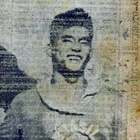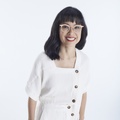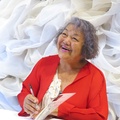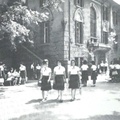To celebrate Okamoto's great achievement, a victory celebration called the "Kappa Festival" was held in his hometown of Marilia on September 28, 1952. Three cows were roasted and a grand churrasco party was held, inviting 1,000 people. According to a report on the event in the Paulista Newspaper dated October 2, 1952, Okamoto's father, Sentaro, was in high spirits throughout the event, saying, "When I started swimming, I trained myself in my Kankai-ryu style (one of the ancient Japanese long-distance swimming techniques)..."
The film "Swimming" also includes valuable testimony from Manuel dos Santos, who won bronze in the 100-meter freestyle at the 1960 Rome Olympics.
"Tetsuo was our idol. We tried our best to imitate him. He was our role model in everything, including the Japanese-like work ethic. He swam more than twice as far as the average Brazilian swimmer. So I told my kids, 'Be like Tetsuo!'" he said.
Thanks to Tetsuo's imitation, Brazilian swimming brought a second medal to the sport.
Okamoto later studied geology at Texas A&M University (Texas Agricultural Mechanical College) in the United States, but he moved away from competitive swimming. After returning to Brazil, he found a job in São Paulo, "working for companies such as Ajinomoto and American companies, but in 1976 he founded a groundwater development and drilling company, also in São Paulo, and is still active today, mainly in the Greater São Paulo area" (Nikkei Shimbun).
Okamoto remained single his whole life. "Back then, even if you won a medal, you didn't appear in commercials, and unlike today, it didn't make you any money. On the contrary, athletes were thought of as vagabonds who didn't work. But thanks to swimming, I was able to go to many countries, I even became a hero at one point, and it gave me good dreams. Even now I work in a job related to water, and for me, who never married, water is like a wife," he said with a carefree laugh in the Nikkei Shimbun.
"Before Okamoto", there were only four Olympic medals. In Antwerp (Belgium) in 1920, Brazil's first Olympic Games, they won one gold, one silver, and one bronze, for a total of three medals. In Paris in 1924 they won none, in Los Angeles in 1932 they also won none, and in Berlin in 1936 they finally won one bronze medal in London in 1948, their first Olympic Games after the war. After that, they won one gold and two bronzes in Helsinki.
In other words, Okamoto's medal was Brazil's fifth overall, a precious one. Moreover, it was the first time in swimming that a child of immigrants had made a national contribution.
Even when we look at the period "after Okamoto," his achievements stand out. His second medal in swimming was a bronze in the 100m freestyle for Manuel dos Santos in Rome in 1960, and his third was a bronze in Moscow in 1980. After this, a period began in the 1990s when four medals were won, and after 2000 when five medals were won. At this year's Rio Olympics, Okimoto Poliana, also of Japanese descent, won a bronze in the long-distance swim, but that was the only medal in swimming history. This shows how ahead of his time Okamoto's medals were.
Including the Rio Olympics, Brazil has won 14 medals in Olympic swimming (1 gold, 4 silver, 9 bronze), but only Okamoto has won in the 1500m freestyle. In Japan, it has become the fourth most medal-winning event after judo, yachting, and athletics, and Okamoto was the first.
That is why, when he passed away on October 2, 2007, Brazil's major media outlets all published obituaries, and the Brazilian Competitive Swimming Confederation (CBDA) mourned his death and declared three days of mourning.
The competitive way they paid tribute was just like the song "As the finish line of the 200m final approached, voices calling for Okamoto rose up" (by Yoshio Takemoto). It was as if the Brazilian people were cheering for their hero who had touched the finish line of his life.
*This article is reprinted from the Nikkei Shimbun ( August 26, 2016 ).
© 2016 Masayuki Fukasawa, Nikkey Shimbun







